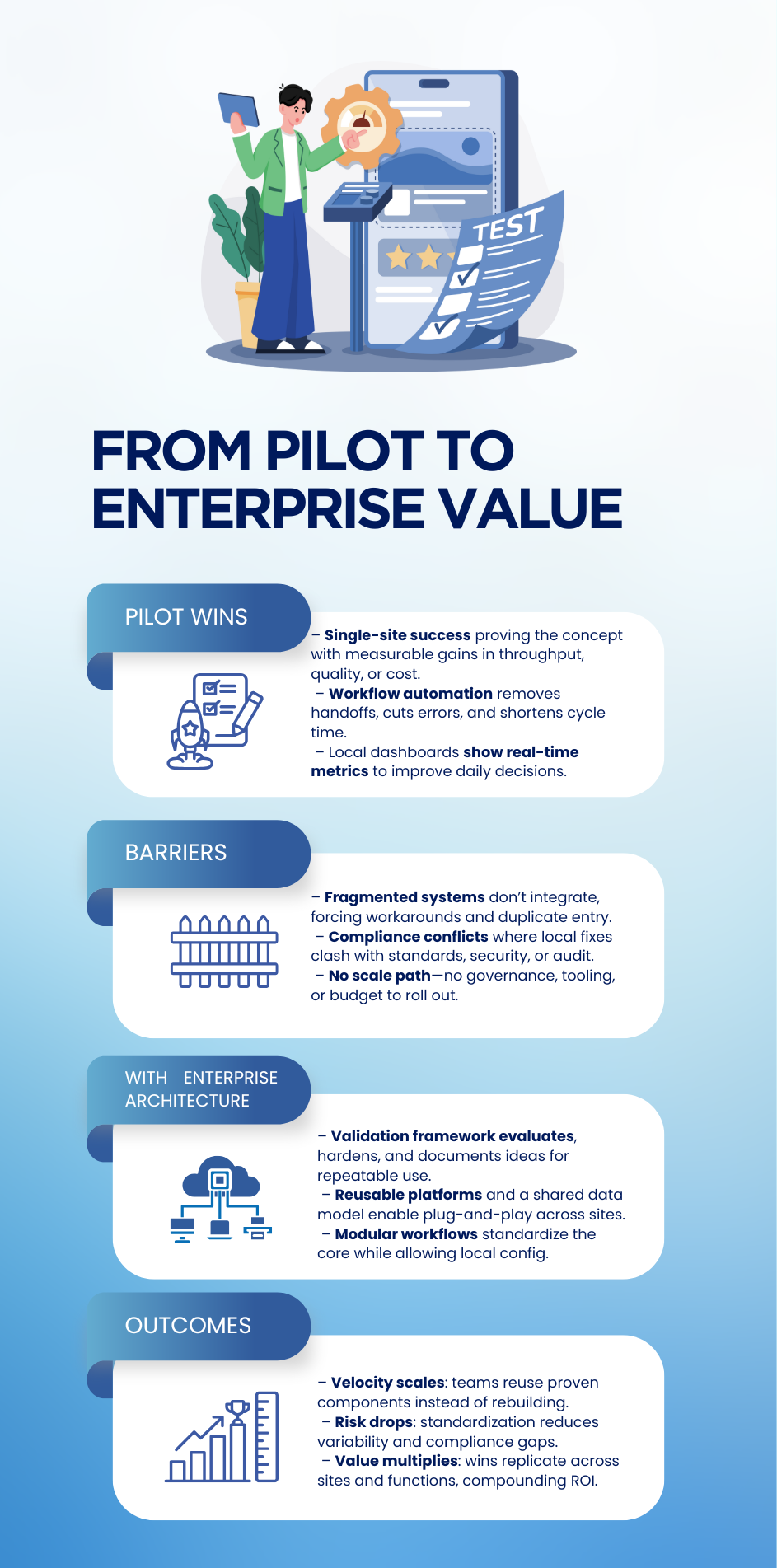Why Architecture Makes or Breaks Innovation
In many industrial firms, innovation is celebrated—but not sustained. A great pilot succeeds at one site, a team automates a workflow, a dashboard goes live… and then nothing happens. No replication. No scaling. No enterprise value.
The root problem? Innovation exists—but without architecture, it cannot spread.
The Pilot Trap: Local Wins, Global Silence
We’ve all seen it. A maintenance supervisor builds a custom tool to track equipment reliability. A planner digitizes their workflow using a spreadsheet macro. A site deploys sensors and shares impressive results.
But without enterprise-level architecture, documentation, and system support, these ideas remain stuck. Worse, they may conflict with corporate platforms, compliance rules, or data standards.
The result? Innovation stalls at the source. The organization loses both the improvement—and the initiative.
When Innovation Is Episodic, So Is Progress
Without an intentional framework to capture, validate, and scale local wins:
- Good ideas go unnoticed
- Teams feel disincentivized to experiment
- Investments in transformation yield scattered results
In effect, you don’t have an innovation strategy. You have innovation moments—disconnected from enterprise impact.

Customer Job (from Value Proposition Canvas)
“Streamline procurement and inventory; integrate systems; control costs”
Related Pains
- No clear pathway to scale successful innovations
- Fragmented systems prevent enterprise-wide replication
- Local wins are lost due to architectural misalignment
Innovation Needs a System—Not Just a Budget
Many boards treat innovation as a series of “greenlight decisions.” But governance means more than funding. It means:
- Creating validation frameworks
- Defining thresholds for enterprise adoption
- Aligning platforms for reuse and consistency
- Incentivizing teams not just to pilot—but to document and share
Innovation must be embedded in the company’s operating model—not dependent on one enthusiastic leader or team.
Platform Thinking Beats Project Thinking
Treat every pilot as a one-off, and you end up with dozens of disconnected solutions. But build a platform—a common data model, shared ERP, modular workflows—and successful ideas become portable.
With enterprise architecture in place, a dashboard built in one site becomes a template for all. A predictive model trained in one division can serve many. Velocity scales. Risk drops. Value multiplies.
Read more about scaling innovation and why platform thinking beats project thinking.
Culture Grows When Innovation Scales
When people see their ideas make it beyond the local level, engagement spikes. They contribute not out of obligation—but because they know it matters. Innovation becomes cultural currency.
But that culture requires structure. Without systems to support it, even your most talented teams burn out on unrepeatable success.
Conclusion: Innovation Isn’t Random. It’s Repeatable.
In today’s competitive landscape, innovation isn’t just about new ideas—it’s about institutionalizing them. If your organization can’t turn pilot success into enterprise performance, you’re leaving value on the floor.
Don’t let innovation die in the field. Build the architecture to carry it forward—and make progress the rule, not the exception. Learn more about enterprise architecture governance and strategic organizational alignment. You can also explore frameworks like TOGAF for structured approaches.
